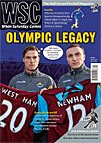 Paul Giess worries that due to administrative failure vast amounts of football merchandise will shortly be out of date
Paul Giess worries that due to administrative failure vast amounts of football merchandise will shortly be out of date
Unlike many competitions around the world South Africa’s Premier Soccer League welcomed February’s midweek FIFA international schedule with open arms. March sees a crucial Africa Cup of Nations qualifier against current holders Egypt, who are regarded as the best side on the continent, despite not making it to last year’s World Cup. At the request of Bafana Bafana coach Pitso Mosimane, a whole raft of scheduled games was moved to accommodate a friendly and give him time to work with his team. The response from the South Africa Football Association (SAFA) made a mockery of the praise that the country earned with its organisation of the 2010 World Cup.
Some weeks before the midweek FIFA date, SAFA announced Bafana Bafana would host Burkina Faso at Rustenburg. The visitors, being ranked 41st in the world and recognised as playing in a similar style to the Egyptians, looked like a decent challenge for the improving home side. Just a few days before the fixture, however, SAFA was forced into an embarrassing climb-down when it emerged they only had a verbal agreement with the Burkina Faso FA and had neglected to complete the formal paperwork. Burkina Faso had subsequently accepted a fixture elsewhere and left Mosimane and his assembled team potentially with a frustrating extended training camp.
At the last moment SAFA was able to persuade Kenya to ditch their friendly commitment in Zambia by dangling the carrot of a night out in a World Cup stadium. Ranked 127th and nothing like the style of the more organised football played in North Africa, Kenya were not the challenge Mosimane really wanted. He could not refuse, of course. So with tickets already sold and players assembled from across Europe and Africa, the game went ahead, resulting in an unconvincing 2-0 victory for the hosts.
This all happened at a time when SAFA was already immersed in accusations of incompetence over its management of the national Under-23 side. SAFA officials had somehow failed to register the squad for the All Africa Games. Fortunately, they were able to enter through the back door after Namibia withdrew from the tournament. Just a few days before the Kenya friendly South Africa sent a hurriedly assembled Under-23 side for a qualifier against Angola, which had already been postponed three times after “communication problems” with the Confederation of African Football.
The ultimate embarrassment still lies ahead, however, and will most probably result in SAFA having to arrange a new nickname for the national side. There is some confusion over who exactly coined the name Bafana Bafana and how it came to be applied to football. A Zulu term of endearment that literally translates as “The Boys”, it was adopted by the national side at the time of the country’s transition to democracy in the early 1990s. What is certain is that a shrewd Johannesburg businessmen, Stanton Woodrush, saw the potential ahead and registered Bafana Bafana as a trademark. SAFA has now taken him to court on three occasions to try to wrestle the name back, with no success. Some media reports put the estimated royalties received on merchandise sales by Woodrush as high as ZAR 80 million (£7m) over the World Cup period alone. In despair at its financial loss, SAFA seems to have finally admitted defeat and announced it will be setting up a formal committee to discuss a new name for the national team.
This might not seem a big deal, but across Africa national sides are predominantly known by their nicknames rather than the actual country’s name. In a continent that features “Super Eagles” and “Indomitable Lions” some people feel Bafana Bafana is not sufficiently awe inspiring anyway. However, a name change now, at a time when the renewed interest in the sport has seen millions of rands’ worth of Bafana Bafana T-shirts, car flags, dog baskets etc snapped up by new fans will not be popular. Bafana Bafana, despite a poor World Cup on the field, has finally become a brand to rival the established Springboks and Proteas in South African society.
One thing is certain among this administrative chaos. The national side are improving rapidly on the poor showing seen in the World Cup and have climbed around 40 places on FIFA’s rankings since last summer’s tournament. There is now hope that they can qualify for a competition that is not organised by SAFA.
From WSC 290 April 2011